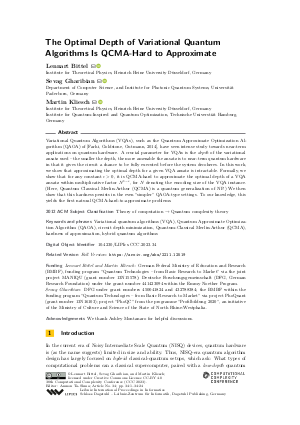@InProceedings{bittel_et_al:LIPIcs.CCC.2023.34,
author = {Bittel, Lennart and Gharibian, Sevag and Kliesch, Martin},
title = {{The Optimal Depth of Variational Quantum Algorithms Is QCMA-Hard to Approximate}},
booktitle = {38th Computational Complexity Conference (CCC 2023)},
pages = {34:1--34:24},
series = {Leibniz International Proceedings in Informatics (LIPIcs)},
ISBN = {978-3-95977-282-2},
ISSN = {1868-8969},
year = {2023},
volume = {264},
editor = {Ta-Shma, Amnon},
publisher = {Schloss Dagstuhl -- Leibniz-Zentrum f{\"u}r Informatik},
address = {Dagstuhl, Germany},
URL = {https://drops.dagstuhl.de/entities/document/10.4230/LIPIcs.CCC.2023.34},
URN = {urn:nbn:de:0030-drops-183045},
doi = {10.4230/LIPIcs.CCC.2023.34},
annote = {Keywords: Variational quantum algorithms (VQA), Quantum Approximate Optimization Algorithm (QAOA), circuit depth minimization, Quantum-Classical Merlin-Arthur (QCMA), hardness of approximation, hybrid quantum algorithms}
}

 Creative Commons Attribution 4.0 International license
Creative Commons Attribution 4.0 International license


